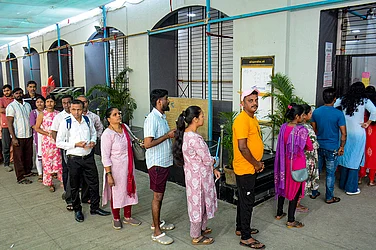Colour of suffering
It’s becoming difficult to live in this village anymore. In summer, every day is steaming hot. Today is hotter than yesterday… and it goes on.
It was not always this terrible. This used to be a village which was cool and airy. Now, the breeze feels very hot, as if a huge fire is burning close by. We are farm labourers, so we have to work daily just to fill our stomachs. I do the housework while everyone else goes to work in the fields.
ALSO READ: Dante’s Peak: Heatwave Horror In Photos
I was not always this sun-burnt. I had fairer skin and long hair. Living and working under the hot sun has burnt my skin. Our children and grandchildren are also dark-skinned due to the blistering heat.
We do not remember the exact year when we came to live in Mowad village in Narkhed taluka in the Vidarbha region of Maharashtra—which falls in the heat wave ‘red zone’. My husband Dhanaram and I came here from neighbouring Madhya Pradesh to work as farm labourers. We are Adivasis. We had come with a group of people, carrying all our meagre belongings. Some of us stayed back in Narkhed taluka and came to live in Mowad village. Our children and grandchildren were all born in this village. We are a large family and try to look after each other.
Brimstone years
Some years after we came to live here, there was a big flood and our houses in the village were washed away. We lost everything in the flood. The old village which was washed away is some distance from here. This is the resettled village. Here, it’s always hot. The heat began to get oppressive after the floods. Neither my husband nor I can recall our respective ages. We are old people and have many grandchildren.
Our houses are made of mud and bricks with a coating of gobar (cow dung). We give the walls a fresh coat of gobar every day. Many years ago, we had thatched roofs. This would keep the house a little cooler. But as the monsoon stared getting fierce, we put tin sheets on the roof. This has made the house unliveable in the summer though. So, all of us sit out under the trees. The hot breeze blowing through the day feels like burning flames on our skins. Even if you are sitting under the trees in the shade, the skin gets burnt.
We all bathe in the evening. But there is no relief. It is very hot even in the night. All the people in my family work very hard. We don’t have water connection in the house, so we have to fetch and store water every morning and evening. We need a lot of water. In this heat wave, we only make dal, rice and some vegetable. For dinner, we have jowar bhakris and chapattis. Though we have electricity poles in the village, power supply is not guaranteed. In fact, throughout the day, there is no electricity. Sometimes, the power comes in the night. The heat is so much that we all have headaches all the time. We also suffer from stomach ailments—diarrhoea is very common. We also get worked up all the time. Everyone is fighting with each other. Even a small thing like “give me a glass of water” can start a fight in the house. We do not have the money to buy coolers, but there is a small table fan.
Flambéed in spice
Our food is spicy and laden with chillies. We eat such food even in summer months. We rear and eat a lot of chicken because it is cheap. We are landless farm labourers, so we can’t grow vegetables. They are very expensive. We depend a lot on dal and cook it every day.
There is always a shortage of money. The farmers do not pay a good wage to farm labourers. Women get Rs 150 a day and men Rs 200 a day. We do the same work, but women get paid less because they tell us we take breaks to breastfeed our small children, or feed the other children. Even if the children do not accompany us and we do the same amount of work, we still get paid only Rs 150 per day. In the summer months, all farmhands work from 6 am to 12 pm, so we get Rs 75 for half the day. The menfolk get Rs 100 a day. When we ask for a raise, they tell us that since the government is giving us free food grains (it started since the Covid-19 lockdowns), we do not need so much money.
We pray to Bholenath to give us relief from this heat.
(As told to Haima Deshpande)
(This appeared in the print edition as "Red Zone Diary")
ALSO READ
Ramrathi Panthre is an Adivasi woman from Maharashtra’s Vidarbha





















